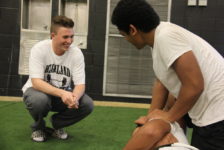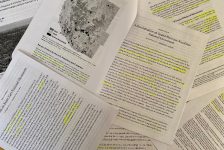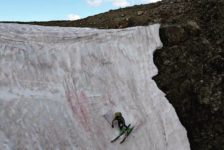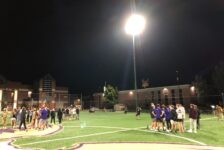Ever dream of spending the day outside, breathing fresh air and getting school credit at the same time? If so, Westminster College’s Outdoor Education and Leadership major and minor have skills classes open to all students, regardless of major or outdoor experience, that provide those opportunities.
For students preparing to register for spring semester, The Forum combed through the college’s course offerings to find alternative ways they can earn credits toward graduation while having fun and learning new skills.

Students at Westminster College tour up the Wasatch Mountains during an Intro to Backcountry class. “The intro class is basically meant to expose people to the equipment they need to go backcountry skiing or snowboarding, as well as some of the logistics like paying attention to the avalanche advisory and knowing where to go,” said Kelly Robbins, the course instructor. (Photo courtesy of Kelly Robbins)
If you’re interested in snow
Class: Intro to Backcountry Touring (OEL*160*01)
Prerequisites: Ability to ski or snowboard
Course Fee: $80
Intro to Backcountry Touring targets students who enjoy skiing or snowboarding at a resort but are interested in exploring the backcountry. Taught by Adjunct Faculty member Kelly Robbins, the class happens in a one-week period, with two meetings for a classroom session, and three days on snow in Little and Big Cottonwood canyons.
“The intro class is basically meant to expose people to the equipment they need to go backcountry skiing or snowboarding, as well as some of the logistics like paying attention to the avalanche advisory and knowing where to go,” Robbins said.
Friday, Saturday and Sunday are spent on the snow, introducing the process of backcountry skiing and going on short tours.
Class: Backcountry Touring Level II (OEL*161*01)
Prerequisites: OEL 160, other avalanche course, or sufficient personal experience
Course Fee: $75
Following the same format as Intro to Backcountry Touring, this Level II course takes students’ baseline knowledge of backcountry touring and avalanche awareness and builds on it.
“The hope is to have students leave the class comfortable with planning their own ski tour rather than just following friends,” Robbins said.
During the class sessions, students plan out travel routes and discuss avalanche awareness and rescue techniques. They also practice transceiver searches on the snow in Big and Little Cottonwood canyons.
Class: Introduction to Winter Camping (OEL*163*01)
Prerequisites: None. Ability to ski or snowboard highly recommended.
Course Fee: $75
Winter Camping should be called snow camping, Robbins said, because the course happens at the end of March and the weather is generally mild.
“It’s not a miserable experience,” she said. “That’s definitely one of the goals is to have a very comfortable experience spending the night outside in the snow.”
The class meets twice to discuss the trip and preparations and then heads to Big Cottonwood Canyon Friday morning for two nights of snow camping and backcountry living. Students will learn how to build a snow kitchen, cook in a snow environment and become comfortable in the snow. Some skiing or snowboard experience is recommended, as those are the modes of transportation to and from the trailhead and camp.

Rosanise Odell, a senior environmental science major, completes a new problem at the Bishop’s Wall at Westminster College. The college offers three climbing classes at the wall for spring 2018, including women’s climbing, indoor climbing and indoor climbing II. (Photo by Lily Wolfe)
If you’d rather be climbing
Class: Indoor Rock Climbing (OEL*150)
Prerequisites: None
Course Fee: None listed
Indoor Rock Climbing is a semester-long introductory course that teaches students top rope climbing and bouldering technique, some strength training, anchor building and cleaning and sport lead climbing. The course meets at Bishop’s Wall at Westminster and focuses on giving students with little or no experience the skills and confidence to climb safely and efficiently. Starting with the basics, the course builds on itself and focuses on what students are interested in learning.
Class: Women’s Indoor Rock Climbing (OEL*152)
Prerequisites: None
Course Fee: None listed
Women’s Indoor Rock Climbing is similar to the indoor climbing class but is more focused on female climbing in terms of technique and strength training.
“Climbing can be pretty intimidating,” said Alexa Hudson, a climbing instructor at Westminster. “A lot of people can perceive [climbing] as pretty strength based, and therefore women can be a little less inclined to try it. I think offering a class that’s focused on women climbers helps address some of that.”
Students watch videos, listen to podcasts and participate in discussions, but the conversation revolves around women in the sport and building a supporting community of climbers.
Class: Indoor Rock Climbing Level II (OEL*153)
Prerequisites: None. However, students with no climbing experience are encouraged to take OEL 151 or 152
Course Fee: None listed
Indoor Rock Climbing Level II delves deeper into curriculum covered in the intro courses.
“We cover a lot of the same material, but in a much faster pace,” Hudson said.
The class reviews and solidifies intro techniques and offers students the chance to learn rescue techniques and more advanced anchor building.
If you want to try something new
Class: Introduction to Canyoneering (OEL*155)
Prerequisites: None
Course Fee: None listed
Canyoneering is essentially the opposite of rock climbing — instead of climbing up a wall, participants descend into a canyon using a harness, ropes and belay devices.
Introduction to Canyoneering is held during the second half of the spring semester, both in classroom settings and in the field. Students spend their time in the classroom learning the rating system used in canyoneering, its history and the equipment used.
They’ll also learn judgement and decision making, hazard evaluation, how to get themselves on rappel and how to move through a canyon safely, Hudson said. The class spends a full day in the Wasatch Mountains practicing canyoneering technique and then travels to Southern Utah for a weekend of canyon exploration.
Class: Introduction to Ice Climbing (OEL*165)
Prerequisites: None. Some rock climbing experience preferred
Course Fee: $175
Ice climbing is similar to rock climbing — participants ascend a wall using their hands, feet, ropes and a harness, but it can take many forms. Ice climbing allows people to continue climbing during the winter by scaling frozen waterfalls on alpine ice, which forms when snow melts and freezes, according to Westminster ice climbing instructor Jason Blauch.
Using crampons, or spikes attached to boots, to kick into the ice and with an ice axe in each hand, the class teaches students how to safely climb outside in the winter.
“Both rock climbing and ice climbing are technical and strength driven,” Blauch said. “But if you get a good placement with your ice tools, you are hanging onto a handle, so it’s not like rock climbing where you need finger strength to hold onto a little hold. If you get a good placement in the ice, you have a giant handle to hold onto.”
The class meets inside to discuss the history of ice climbing and prep for its full day of climbing on natural ice in Provo Canyon. Students then travel to Ouray Ice park in Colorado for three days of climbing on human-made ice.









